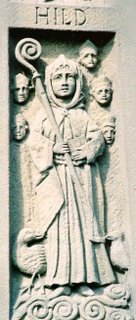 I have written before about my high school Greek teacher, a British Plymouth Brethren, Elizabeth Wilson, who now suffers from alzheimers. Here is another memory from those long hours when she taught me as a lone Greek student.
I have written before about my high school Greek teacher, a British Plymouth Brethren, Elizabeth Wilson, who now suffers from alzheimers. Here is another memory from those long hours when she taught me as a lone Greek student.Most of our classes revolved around Homer's Iliad and Odyssey, with special attention to the passages about young women. We also read chapters of Acts, but little else in the NT. It was a classics course. However, I was also required to write a paper about the Proverbs 31 woman.
My remaining impressions were that a woman should learn how to weave, which I did; have servants, which I do not; and finally, buy and sell real estate.
We never really talked about the 'women in the church' issue, but she did make one comment that I remember still. She said,
"Things have not gone well for women in England since the Roman church took over from the Celtic church."
She spoke as if she was talking of events that had taken place the year before. I raised my eyebrows. As my adolescent brain climbed the ladders of time, I discounted the Tractarian controversy, Bonnie Prince Charlie, and poor old James II - didn't he escape in a row-boat? I finally settled on Queen Mary, bloody Mary, surely that is what she was talking about.
Looking pained at my ignorance of early British history, she explained that she was refering to Hilda of Whitby, who was abbess in Northumberland in the 7th century. And so I learned then of the legacy of the Celtic church and came later to read Caedmon's song and the Dream of the Rood. I understood that my teacher felt the loss of the rich spirituality of men and women together, with the immediacy of a recently lost legacy, not something clouded by the passage of millenia.
Hilda was the abbess of a religious community of men and women together. She was a teacher of theology and was consulted by royalty. Northumberland became a great centre of learning at that time.
Hilda also hosted the Synod of Whitby where certain ecclesiastical differences between the Celtic and Roman churches were settled. Since that time the Roman church gained influence in England. At least that is how I understood it.
- Almost all of our knowledge of St. Hilda (Hild) is derived from the writings of the Venerable Bede. Her correct name, Hild, means "battle." She was born in Northumbria in 614, the daughter of Hereric, the nephew of King Edwin of Northumbria, making her King Edwin's grandniece. She, like her great-uncle, was brought to Christ through the preaching of St. Paulinus, who baptized her in 627 at the age of 13 when King Edwin and his entire household became Christians.
She lived the life of a noblewoman until 20 years later when she was moved by the example of her sister Saint Hereswitha who became a nun at the Chelles Monastery in France. Hilda intended to follow her sister abroad, but St. Aidan persuaded her to return to Northumbria in 649. She was initially put in charge of a small group of women who were also aspiring to the religious life at a small house on the River Wear, but Bishop Aidan soon realized she was ready for wider responsibilities.
There was a much larger and fully established religious house of women at Hartlepool whose Foundress, Bega (St. Bee), was founding a new house at Tadcaster. Hilda was called to take her place as Superior. St. Hilda ruled at Hartlepool for some years with great success before being called to found a monastery at Streaneshalch, a place to which the Danes a century or two later gave the name of Whitby.
St. Hilda governed the monastery at Whitby for the rest of her life. Under Abbess Hilda, Whitby gained a great reputation, becoming a burial place for kings, and a place of pilgrimage. The fame of St. Hilda's wisdom was so great that from far and near monks and royal personages came to consult her. Whitby was also a double monastery: a community of men and another of women, with the chapel in between, and Hilda as the governor of both. It was a great center of learning, especially the study of sacred scripture.
Whitby was known as a place where clergy, monks and nuns could receive a rigorous and thorough religious education. The arts and sciences were so well established by her that it was regarded as one of the best seminaries for learning in the then known world. No less than five of her subject monks later became bishops, including Saint John of Beverly, and Saint Wilfrid of York.
St. Hilda was especially revered for her ability to recognize spiritual gifts in both men and women. Her kindheartedness can be seen from the story of Caedmon, one of her herdsmen, whose poetic gift was discovered and nurtured by Hilda. She encouraged him with the same zeal and care she would use toward a member of the nobility, urging him to use his gifts as a means of bringing the knowledge of the Gospel Truth to common folk. St. Caedmon later composed the first hymns in the English language.

1 comment:
Hear! Hear!
Post a Comment